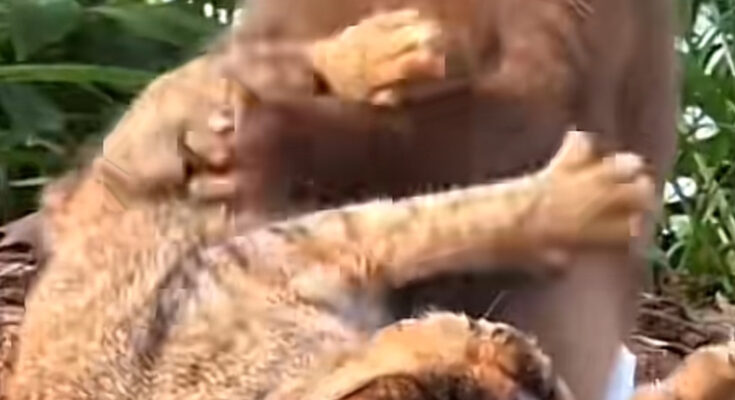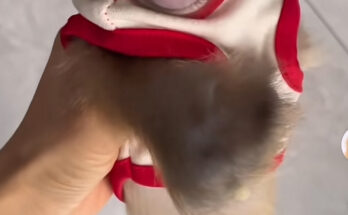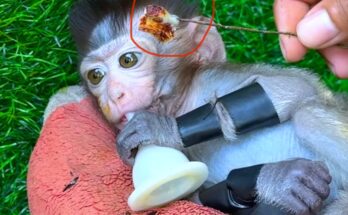In a surprising and heartbreaking incident that has shocked a local community and sparked conversations about human interaction with wildlife, a baby monkey attacked and bit a young kitten, resulting in serious injuries. The event, which unfolded in a semi-urban neighborhood where wild animals and pets often cross paths, has raised important questions about animal behavior, human responsibility, and urban-wildlife conflict.
A Playful Encounter Gone Wrong
According to witnesses, the baby monkey had been seen in the area for several days. Residents initially viewed it as a curious, playful creature that occasionally descended from nearby trees to explore gardens, balconies, and rooftops. On the day of the incident, the monkey reportedly approached a domestic kitten that was lounging outside a house.
At first, the encounter seemed harmless. Onlookers believed the monkey was simply curious and trying to play. But in moments, the situation escalated. For reasons still unclear—possibly fear, territorial behavior, or overstimulation—the monkey became aggressive and bit the kitten multiple times before fleeing the scene.
Kitten Sustains Serious Injuries
The kitten, a four-month-old domestic short-hair, suffered puncture wounds to the neck and abdomen. It was immediately rushed to a local veterinary clinic, where it underwent emergency treatment. Vets have confirmed that while the kitten’s condition is serious, it is stable and expected to survive with continued care.
“This is a rare but not entirely unpredictable case,” said Dr. Sandeep Rao, the veterinarian treating the kitten. “Wild animals, even young ones like this monkey, can become aggressive when they feel threatened or overstimulated. It’s a reminder that not all cross-species interactions are safe, especially when humans are feeding or encouraging wild animals to stay close.”
A Growing Issue: Urban-Wildlife Overlap
Incidents like these are becoming increasingly common as urban development encroaches on natural habitats. In many regions, monkeys adapt quickly to human environments, scavenging for food and even engaging with people and pets. While some interactions appear friendly or entertaining, they can quickly turn dangerous—for both wildlife and domestic animals.
Experts warn that feeding or approaching wild animals, especially primates, is risky. Baby monkeys may seem harmless, but they possess strong jaws and unpredictable behavior, especially without their natural family groups to guide them.
Calls for Awareness and Action
Following the incident, animal welfare groups are urging local authorities to relocate the monkey to a wildlife rehabilitation center, where it can receive proper care and possibly be reintegrated into a more suitable environment. Meanwhile, pet owners are being cautioned to supervise their animals, especially in areas where wildlife is known to roam freely.
“This is a tragic lesson for all of us,” said Meena Patel, a volunteer at a nearby animal shelter. “We must learn to coexist with wildlife respectfully—without turning them into neighborhood mascots or treating them like pets.”
As the kitten continues its recovery, this story serves as a stark reminder of the delicate—and sometimes dangerous—balance between humans, their animals, and the wild creatures that share our space.



